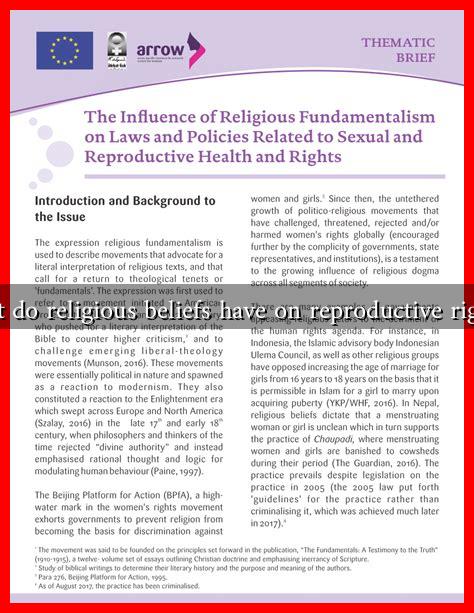-
Table of Contents
- What Impact Do Religious Beliefs Have on Reproductive Rights Debates?
- The Role of Religion in Shaping Attitudes Toward Reproductive Rights
- Case Studies: Religious Influence on Reproductive Rights Legislation
- The United States
- Global Perspectives
- Statistics and Public Opinion
- The Future of Reproductive Rights in a Religious Context
- Conclusion
What Impact Do Religious Beliefs Have on Reproductive Rights Debates?
The intersection of religion and reproductive rights is a complex and often contentious issue that shapes public policy and personal choices across the globe. Religious beliefs can significantly influence opinions on reproductive health, including contraception, abortion, and sex education. This article explores the impact of religious beliefs on reproductive rights debates, highlighting key examples, statistics, and case studies.
The Role of Religion in Shaping Attitudes Toward Reproductive Rights
Religious beliefs often dictate moral and ethical standards, which in turn influence individual and societal views on reproductive rights. Different faiths have varying teachings regarding the sanctity of life, sexual morality, and family planning. Here are some ways religion shapes attitudes:
- Doctrine and Teachings: Many religions have specific doctrines that address reproductive issues. For instance, the Catholic Church opposes abortion and contraception, advocating for natural family planning methods.
- Community Influence: Religious communities often reinforce shared beliefs, creating a collective stance on reproductive rights that can affect local and national policies.
- Political Mobilization: Religious groups frequently mobilize to influence legislation, as seen in the United States with organizations like the Family Research Council and Planned Parenthood.
Case Studies: Religious Influence on Reproductive Rights Legislation
Several countries and regions provide clear examples of how religious beliefs impact reproductive rights legislation:
The United States
In the U.S., the debate over reproductive rights is heavily influenced by religious beliefs, particularly among conservative Christian groups. The overturning of Roe v. Wade in 2022 by the Supreme Court exemplifies this influence. Many states with strong religious affiliations have enacted laws that restrict access to abortion services. For instance:
- In Texas, Senate Bill 8 effectively bans most abortions after six weeks, reflecting the state’s strong evangelical Christian base.
- In Alabama, a near-total abortion ban was passed, with proponents citing religious beliefs as a justification for protecting what they consider the sanctity of life.
Global Perspectives
Religious beliefs also shape reproductive rights in other parts of the world. For example:
- Latin America: Many countries in this region, such as El Salvador and Nicaragua, have strict anti-abortion laws influenced by Catholic doctrine, leading to severe penalties for women and healthcare providers.
- Middle East: In several Middle Eastern countries, Islamic teachings influence laws regarding family planning and reproductive health, often limiting access to contraception and abortion.
Statistics and Public Opinion
Public opinion on reproductive rights often reflects underlying religious beliefs. According to a 2021 Pew Research Center survey:
- Approximately 61% of Americans who identify as religiously unaffiliated support legal abortion, compared to only 27% of white evangelical Protestants.
- In countries with high levels of religious adherence, such as Nigeria, over 80% of the population opposes abortion in most cases, reflecting the influence of religious teachings.
The Future of Reproductive Rights in a Religious Context
As society evolves, the role of religion in reproductive rights debates continues to be a double-edged sword. While some religious groups advocate for women’s rights and access to reproductive healthcare, others maintain traditional views that restrict these rights. The future will likely see:
- Increased Advocacy: More religious organizations may begin to advocate for reproductive rights, emphasizing compassion and women’s health.
- Legal Challenges: Ongoing legal battles will continue as differing religious beliefs clash with secular laws regarding reproductive health.
- Global Disparities: The impact of religion on reproductive rights will vary significantly across different cultures and regions, leading to a patchwork of laws and access.
Conclusion
Religious beliefs play a pivotal role in shaping the debates surrounding reproductive rights. From influencing public opinion to dictating legislation, the impact of faith on reproductive health is profound and multifaceted. As society grapples with these issues, understanding the interplay between religion and reproductive rights will be crucial for fostering informed discussions and policies that respect both individual autonomy and deeply held beliefs. The ongoing dialogue will likely continue to evolve, reflecting the changing landscape of both religion and reproductive health.
For further reading on the intersection of religion and reproductive rights, you can explore resources from the Pew Research Center and other organizations dedicated to reproductive health advocacy.

